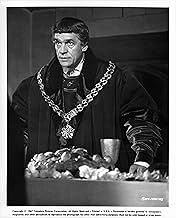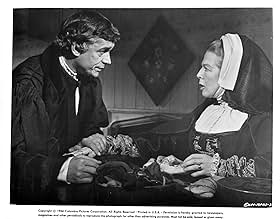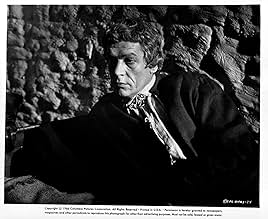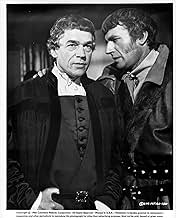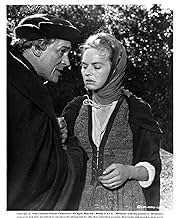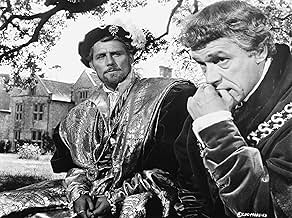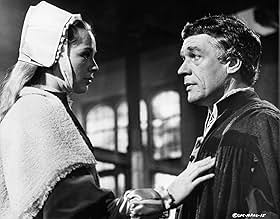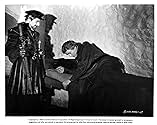A história de Sir Thomas More, que enfrentou o rei Henrique VIII quando o rei rejeitou a Igreja Católica Romana para obter um divórcio e se casar novamente.A história de Sir Thomas More, que enfrentou o rei Henrique VIII quando o rei rejeitou a Igreja Católica Romana para obter um divórcio e se casar novamente.A história de Sir Thomas More, que enfrentou o rei Henrique VIII quando o rei rejeitou a Igreja Católica Romana para obter um divórcio e se casar novamente.
- Ganhou 6 Oscars
- 34 vitórias e 9 indicações no total
Avaliações em destaque
The Tudor dynasty of England was an interesting 120 years or so. This film focuses on the very brief time that Henry VIII was fighting the Roman Catholic Church over him marrying a second wife after the same church had made a special dispensation for him to marry the first, with that first wife now past the age of childbearing and no surviving son resulting from the marriage.
Into the fray comes Sir Thomas More, a devout Catholic. This film distills More's viewpoints down to his refusal to recognize that Henry has any right to break off from Rome and declare himself supreme head of the church in England. More seemed willing to help with arguments made to Rome in favor of granting Henry a divorce from his first wife, Katharine of Aragon, but he would not go past that into the taking of church property as Woolsey suggested or into the complete break from Rome that Henry eventually made. More was willing to help Henry as far as "working within the system", but he believed that system - the Roman Catholic Church - was established by God and he would not support an alternative view.
More remained silent on the issue of what Henry was doing, thinking this would protect him. He even remains silent to the viewer, since he refuses to share his opinion with anyone, though one can surmise it from what he has said he will not do or swear to and the resignation of his office of chancellor.
The real irony is everybody wondering at More's caution proclaiming - "This isn't Spain, it's England!", with everyone being so sure of their civil liberties there. Yet Thomas Cromwell was executed by Henry in 1540 for pretty much facilitating his marriage to an unattractive woman (Anne of Cleves), Anne Boleyn was executed on trumped up charges of adultery because she too failed to produce a male heir and a second divorce would have just been embarrassing, and the Duke of Norfolk only escaped execution because Henry died the night before Norfolk's scheduled execution. So it turned out that in Tudor England, dying in bed could be a goal difficult to attain in spite of it not being Spain.
In the end, More was executed because of the lies of RIchard Rich, as depicted in the film. More had this guy's number from the beginning. Before his fall from grace, More had urged Rich to take a teaching job and not press his luck at court because of his weakness of character and thus his susceptibility to being bribed and tempted. And yet it was the morally weak and treacherous Rich who eventually ascended to the office of chancellor, lived past the age of 70, and died in bed of natural causes.
The strength of this film lies in its performances - Scofield's steadfastly loyal and honest Thomas More, Robert Shaw as the bombastic and big as life Henry VIII, Susannah York as More's well educated and wise daughter, and especially an almost unrecognizable John Hurt as the slimy little weasel Richard Rich. My apology to weasels everywhere.
It is intensely political and philosophical and really appeals to people who think about standing up for one's ideals even when it is very easy to allow ethics to be bent.
I can't add anything to what has already been said about A Man for All Seasons. Unquestionably one of the greatest films of all time, and stands the test of time. It will be revered as a great film 100 years from now. Will Lebowski? Doubt it. Winner of nearly every award it was nominated for. Best Picture, Best Director, Best Actor, Best Screenplay, etc. One of the few movies that makes my whole being vibrate when I watch it. I am moved to tears in almost every scene because the scene is executed so perfectly.
Please IMDb, this must give you pause. Any system that does not put this film in the top 100 borders on insanity or uselessness.
"From Here To Eternity" may well be Zinnemann at his highest tide, though IMDb voters seem to prefer "High Noon." Then there's "A Man For All Seasons," the film of the year in 1966, though its hard to imagine a film that represents the ethos of the 1960s less. "A Man For All Seasons" presents us with an unfashionable character who refuses to surrender his conscience to the dictates of king and countrymen, resolute instead in his devotion to God and Roman Catholic Church.
"When statesmen lead their country without their conscience to guide them, it is short road to chaos," Thomas More tells his nominal boss, Cardinal Wolsey, when the latter unsuccessfully presses him to give his blind assent to King Henry VIII's request for a convenient divorce. Perhaps out of pique, Wolsey makes sure More inherits his office of Counselor of the Realm, where More's sterling convictions are really put to the test.
More is a marvel of subtleties, tensile steel covered in a velvet glove, a mild-mannered lion trying at every turn to do well even though his political savvy knows how dangerous that can be. As a lawyer, More knows the angles, yet he is no sharpie. He respects the law too much for that. Rather, he sees in law the only hope for man's goodness in a fallen world. "I'd give the Devil benefit of the law, for my own safety's sake," he explains.
Paul Scofield plays More in such a way as to make us not only admire him but identify with him, and come to value both his humanness and his spirituality. His tired eyes, the way he gently rebuffs would-be bribers around Hampton Court, his genuine professions of loyalty to Henry even as he disagrees with the matter of his divorce, all speak to one of those great gifts of movies, which is the ability to create a character so well-rounded and illuminating in his window on the human condition we find him more haunting company than the real people we meet in life. It's a gift the movies seldom actually deliver on, so when someone like Scofield makes it happen, it is a object of gratitude as much as admiration.
The script, adapted by Robert Bolt from his stage play, is very literate and careful to explain the facts of More's dilemma. It moves too slowly and opaquely at times to qualify "A Man For All Seasons" as a true classic, that and a supporting cast full of one-note performances, though some are quite good (a few, however, are notably flat.) I especially liked Robert Shaw as a young and thin Henry VIII, full of vigor yet also a childish temperament and inconsistent mind. He demands More not oppose his marriage to Anne Boleyn, then decides he must have either More's outright assent or else his head. There's no bargaining with such a man. Perhaps More was better off standing on his principals as he did than climbing into bed with homicidal Henry. Just ask Anne.
Zinnemann presents some interesting visual images in "A Man For All Seasons," letting the period detail inform the story without overwhelming it. Several times, such as during the opening credits, inside More's cell at the Tower of London, and during More's trial, the camera shoots through narrow openings surrounded by high stone walls, a reminder not only of More's own trapped situation but the human condition. Aspirations of divinity may be unfashionable, even dangerous to one's health, but they present mankind with its one hope for overcoming its base nature, the dead-end character of temporality. "A Man For All Seasons" is a rallying cry for just such an approach to life, and remains undeniably effective in its artful, artless way.
It's very easy to see this film superficially as a moral fable, and many people scoff at it as being a stagy morality play. But it's both more subtle and more vibrant that that. The subtlety of Robert Bolt's script lies in its exploration of identity. We're not meant to identify or admire More's religious ideas, which the movie actually tiptoes around. Instead it's what Bolt called More's "adamantine sense of his own self" that the movie really highlights.
Oscars Best Picture Winners, Ranked
Oscars Best Picture Winners, Ranked
Você sabia?
- CuriosidadesProducer and director Fred Zinnemann, as quoted in his autobiography, calls this the easiest movie he ever made, thanks to the extraordinary caliber of the crew, and the actors and actresses, and the way they worked together.
- Erros de gravaçãoLord Chancellor Wolsey did not die in office; he was removed from the office of Lord Chancellor by Henry (because of his displeasure at Wolsey's failure to secure a divorce from Catherine), and died more than a year after Sir Thomas More became Lord Chancellor. Wolsey did, however, remain Archbishop of York.
- Citações
William Roper: So, now you give the Devil the benefit of law!
Sir Thomas More: Yes! What would you do? Cut a great road through the law to get after the Devil?
William Roper: Yes, I'd cut down every law in England to do that!
Sir Thomas More: Oh? And when the last law was down, and the Devil turned 'round on you, where would you hide, Roper, the laws all being flat? This country is planted thick with laws, from coast to coast, Man's laws, not God's! And if you cut them down, and you're just the man to do it, do you really think you could stand upright in the winds that would blow then? Yes, I'd give the Devil benefit of law, for my own safety's sake!
- ConexõesFeatured in Precious Images (1986)
Principais escolhas
Detalhes
- Data de lançamento
- País de origem
- Idiomas
- Também conhecido como
- El hombre de dos reinos
- Locações de filme
- Empresa de produção
- Consulte mais créditos da empresa na IMDbPro
Bilheteria
- Orçamento
- US$ 2.000.000 (estimativa)
- Faturamento bruto mundial
- US$ 756
- Tempo de duração2 horas
- Cor
- Proporção
- 1.66 : 1
Contribua para esta página







